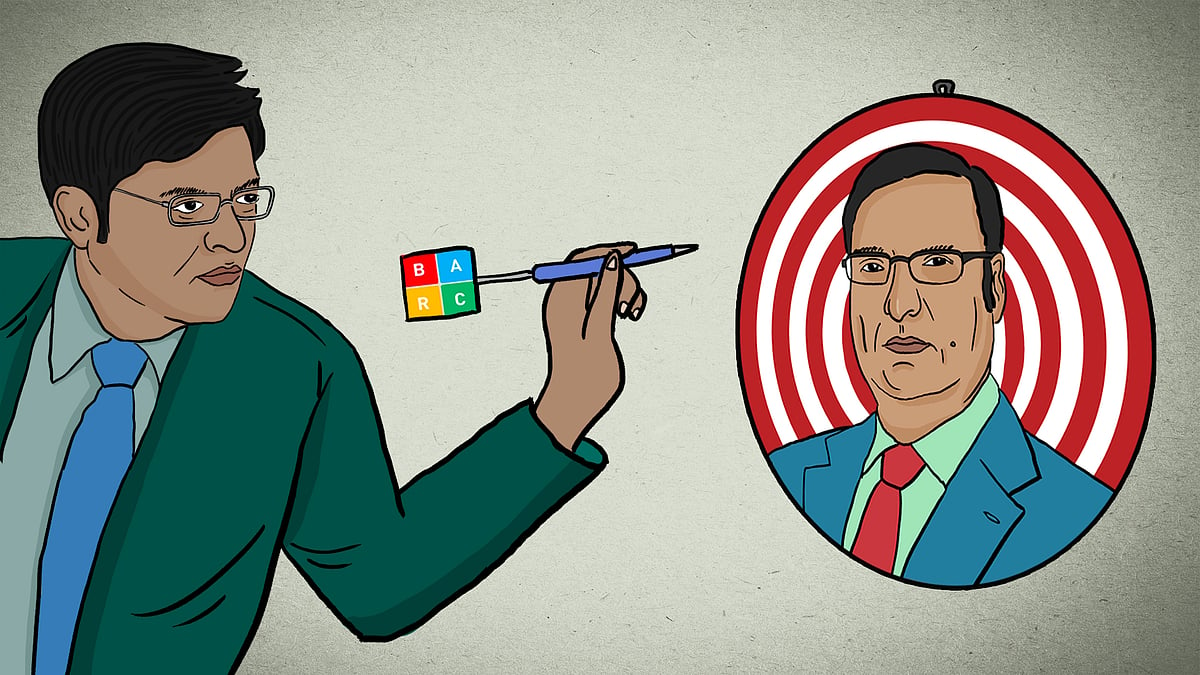From Asianet to Manyavar: How Republic became an ‘editor-controlled’ company
A forensic audit in the TRP scam narrates how Arnab Goswami diluted Asianet’s stake in his media network through alleged ‘round-tripping’ and ‘overvalued’ shares.
The Republic Media Network received more than Rs 2 crore from Asianet News Media & Entertainment Pvt Ltd to repurchase its shares from Asianet in 2019. These are the claims made in an interim forensic audit report produced by accounting firm Sarath and Associates, and filed by the Mumbai police in the TRP scam.
According to the audit, the transaction purportedly occurred through the personal account of the network’s editor-in-chief and managing director Arnab Goswami. The audit has termed this transaction as “round-tripping” – a disingenuous practice to bolster a company’s business to make it appear more profitable and attract investors.
The forensic audit states that ARG Outlier Media Pvt Ltd, the company that runs the Republic Media Network, “indulged in artificially increasing its share value and collecting investments and routing some of these funds to repurchase its own shares through its parent company at 300% higher value”.
In 2019, Goswami had claimed that he had repurchased Republic’s shares from Asianet to make the media network an “editor-controlled” company. The audit has revealed that Goswami bought a fraction of these shares. Half a dozen other investors – including Ravi Modi of the clothing brand Manyavar – invested more than Rs 80 crore in Republic.
The dilution of Asianet’s shares at Republic was preceded by the entry of other corporate players in the network, including the RP-Sanjiv Goenka Group, knitwear brand Rupa, and biscuit manufacturer Anmol Industries.
In a 2,500-word statement to Newslaundry, the Republic Media Network claimed that the forensic audit is “biased, fabricated and malicious” and a “a tailor-made document for the Mumbai Police in its quest to desperately try and reverse engineer a case against one media entity and one journalist.”
You can read the full statement by the network here:
‘A campaign of canards’: Republic’s statement on the forensic audit of the TRP scam
Republic’s brand new investors
The story starts in December 2016, when Asianet News Media & Entertainment Pvt Ltd bought 48,681 CCPP shares – compulsory convertible participatory preference shares – of ARG Outlier Media. With a face value of Rs 10 and a premium of Rs 12,300, the shares cost nearly Rs 60 crore.
According to the audit, three years later, between May 2019 and January 2020, Asianet sold nearly 30,000 of these shares to a slew of investors at a premium of Rs 36,548 for more than Rs 109 crore.
Ravi Modi of Manyavar, an avid Republic advertiser, spent more than Rs 62 crore through multiple channels to buy about 17,000 CCPP shares. The Mumbai-based Taparia clan, which owns Famy Care, a company that manufactures contraceptives for women, bought shares worth Rs 10 crore. RSH Global, which owns the personal care brands Joy and Karis, spent Rs 3 crore.
Anil Kumar Gupta, the managing director of Veeline, who was interviewed at the Republic Summit in 2019, shelled out more than Rs 1 crore through a company called SRS Trading and Holding Pvt Ltd. The audit states that this company’s investment into Republic is not in the nature of its regular business or investment activity.
Four individuals – Pavan Bhatia, Vinod Rao, Piya Rao, and Naveen Sangari – bought shares worth Rs 10 crore.
Goswami himself bought 148 CCPP shares from Asianet at Rs 54 lakh. SARG Media Holding, the parent company of ARG Outlier Media, bought 5,658 CCPP shares which cost more than Rs 20 crore – nearly triple Asianet’s investment in 2016 – at a premium of Rs 12,300.
Overvalued shares?
Newslaundry accessed Republic’s valuation reports for 2018 and 2019, prepared by accounting firm Resurgent India.
The reports show that in 2016, before Republic’s launch, its media network’s shares were valued by accounting firm Ashwin & Associates at a premium of Rs 12,300 per share.
In 2018, Republic raised this by 166 percent to Rs 32,823 per share. The value further climbed to Rs 36,560 – 300 percent of its initial value – in 2019, the year the network launched Hindi news channel Republic Bharat.
The valuation reports based the rising share value on grand projections. In 2018, it projected a profit of Rs 11 crore for the network in 2019 and a staggering Rs 121 crore in 2023. In 2019, the 2023 profit projection climbed to Rs 148 crore, and to Rs 183 crore for 2024.
In 2018, ARG Outlier Media incurred an annual loss of Rs 78 lakh. In 2019, the annual loss was Rs 19 crore.
The forensic audit report notes: “The year on year growth rate of revenues are considered at 29% for ARG [Outlier Media], however, the industry growth considered in this valuation report is only 13.1%.”
The media network dismissed these claims.
“When a company’s top line goes up, when a news organisation grows from one channel into a network with two channels and a digital business, it is but natural that the valuation will go up correspondingly,” it said in a statement to Newslaundry. “The company revenue went from about Rs 140-150 crore to about Rs 288 crore in the second year and was projected to grow to Rs 330 crore in the third year. Given that valuation is based on present top-line and present profit, the expansion of the network and its success naturally translated to higher valuation.”
According to ROC filings from May 2019, SARG Media has 80.36 percent stake in ARG Outlier Media. Goswami personally owns 62.13 percent shares in SARG Media and 0.03 percent in ARG Outlier Media.
‘Round-tripping’
The forensic audit narrates how Republic obtained Rs 20 crore to buyback shares from Asianet. It claims that SARG Media allegedly borrowed at least Rs 15 crore from Reclamation Realty (India) Pvt Ltd, a subsidiary of DSP HMK Holdings, which runs the DSP Mutual Fund.
According to its website, the DSP Group has business links with big players in India Inc: Tata, Godrej, Mahindra, Indiabulls, BSE Limited, among others.
According to documents filed by SARG Media with the registrar of companies, Hemendra Kothari, who runs the DSP Group, owns 50,000 preference shares in the company.
The forensic audit claims that transactions between Goswami, SARG Media and Asianet indicate “round-tripping” of funds: at least Rs 2.18 crore paid by SARG Media to Asianet in October 2019 came from Asianet via Goswami.
In August and September 2019, Asianet allegedly transferred Rs 4 crore to Arnab Goswami’s personal account in HDFC bank. Goswami used Rs 1.25 crore of this to pay taxes, invest in a fixed deposit, and transferred Rs 2.18 crore to SARG Media on September 13, 2019. On October 5, 2019, SARG transferred Rs 2.19 crore to Asianet’s account in exchange for 600 shares.

The audit states: “These transactions raise suspicions over the genuineness of such value of the CCPPS, its valuations which are based on the very high growth levels of ARG Outlier [Media], require to be further investigated.”
Republic Media Network told Newslaundry that the “round-tripping” allegation made in the audit is “bizarre”. The transfer of Rs 2.18 crore from Goswami’s account to SARG Media on September 13, 2019, it added, was a partial payback of a loan that the editor-in-chief had taken from the company six months before “to meet his short-term financial commitments”.
The network stated that since Goswami was on Asianet’s board of directors, he was “entitled to monetary compensation” from the company, adding that the anchor availed this amount only in March 2020.
However, the audit claims that Asianet transferred Rs 2.28 crores to Goswami’s personal account on September 6, 2019.
The ‘high ticket’ transactions
In the first half of 2019, five investors arrived at Republic’s doorstep. These companies bought 9,910 Republic shares at a premium of Rs 32,823 between January and May, 2019, amounting to Rs 32.5 crore.
The largest buyer was RPG Power Trading, part of the RP-Sanjiv Goenka Group, a prominent advertiser on the network and the main sponsor of the Republic Summit in 2019. The group owns magazines like Open and Fortune and has a majority stake in the news platform Editorji.
RPG Power Trading bought 3,050 shares worth Rs 10 crore in ARG Outlier Media, according to the audit, after liquidating its investment in HDFC Mutual Fund.
The audit notes that CESC Limited, an electric supply company of the Goenka group, spent Rs Rs 6.5 crore on advertising on the Republic Media Network in 2018-19.
About RPG Power Trading’s business with Republic, the audit says: “As per the analysis of the investment transaction, this is a high ticket transaction inconsistent with the business of the company with no apparent relation to their normal business activity.”
The media network told Newslaundry that this allegation is “shallow, hollow and bereft of any concrete truth”. “Almost all media organisations have some proportion of debt or equity which is investment from outsiders of the industry, calling this a crime is calling all media houses in India criminal,” it said.
The other four companies who bought the broadcaster’s shares are Pan Capital Investments, Anant Udyog LLP, Purvanchal Leasing Ltd (now amalgamated into Ullas Sales Promotion Pvt Ltd), and Dynamic Storage and Retrieval Systems Pvt Ltd.
Dynamic Storage and Retrieval Systems is a company run by the family of Manyavar’s Ravi Modi.
Anant Udyog is owned by Kolkata-based Anmol Industries, a biscuit-manufacturing brand.
Purvanchal Leasing is owned by the Kolkata-based Rupa brand, which manufactures knitted garments. Vikash Agarwal and Mahesh Agarwal, the directors in Purvanchal Leasing, are president and whole-time director at Rupa and Co., respectively. Vikash also holds the post of president of the Indian Chamber of Commerce.
Purvanchal Leasing, the audit claims, has been listed as a “high risk financial institution” by the ministry of finance because of non-compliance with rules. Its transactions with Republic have “no economic rationale in their banking transactions, rotational transactions with no apparent legitimate business purpose,” it says.
 Arnab Goswami versus Rajat Sharma: How BARC became a conduit to settle scores
Arnab Goswami versus Rajat Sharma: How BARC became a conduit to settle scores Ferrari, Rolex, and TRP rigging: Audit report exposes malpractices at BARC
Ferrari, Rolex, and TRP rigging: Audit report exposes malpractices at BARC